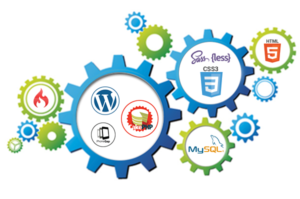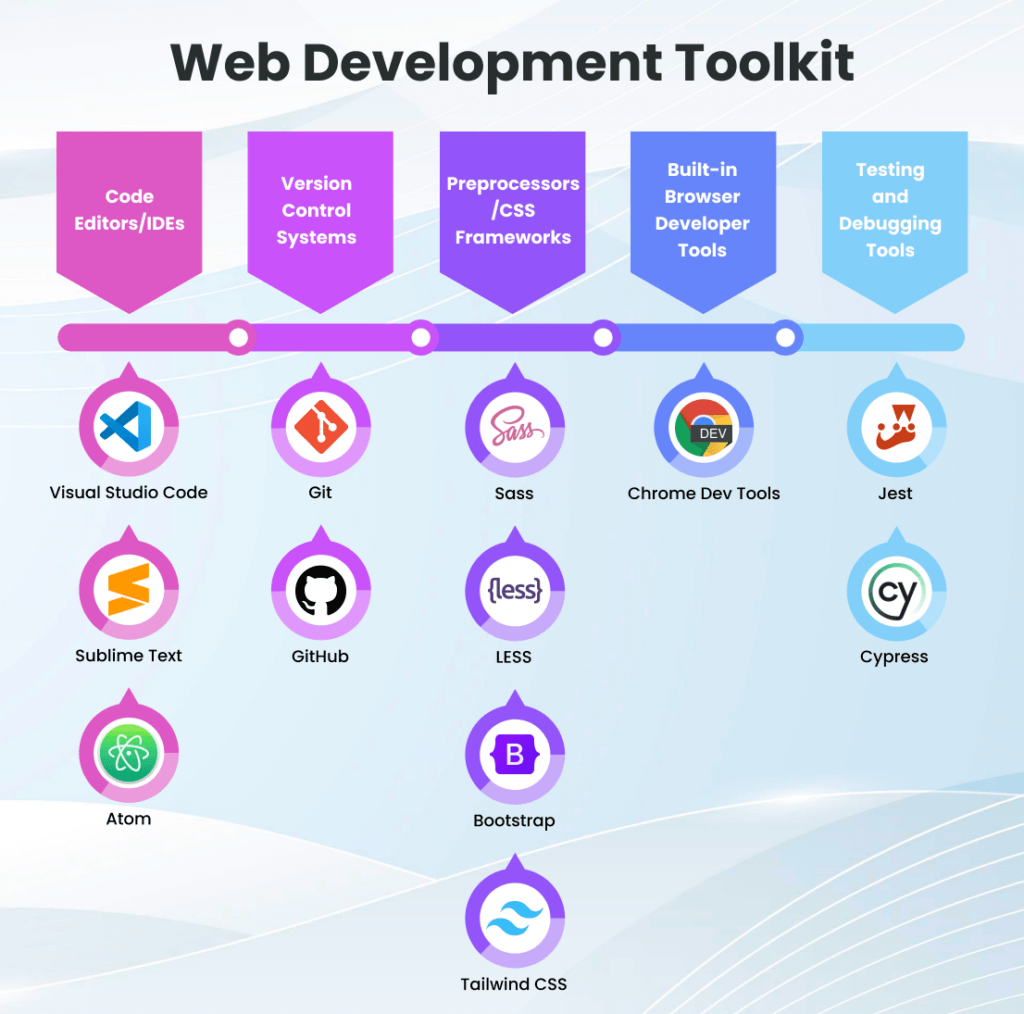The Ultimate Guide to Website Development Tools in 2025
Website development tools play a pivotal role in ensuring a smooth and efficient process, whether you’re building a simple personal blog or a complex e-commerce platform. With the right tools, developers can speed up their workflows, improve collaboration, and create more scalable and secure websites. This guide will explore some of the best website development tools in 2025 and how they can enhance your development process.
Introduction
Website development has become increasingly streamlined thanks to the variety of tools available today. These tools assist developers in handling everything from coding and debugging to performance optimization and content management. The right tool can greatly impact the efficiency of the development process, the quality of the code, and the overall user experience of the website.
In this blog, we’ll dive into the most popular and essential tools for website development, including code editors, frameworks, version control systems, design tools, and more. We’ll also explore some advanced tools for performance testing and SEO optimization.

1. Code Editors
Code editors are one of the most essential tools for website development. They help developers write clean, organized, and error-free code. Some of the most popular code editors include:
- Visual Studio Code (VS Code): A free, open-source code editor with built-in support for JavaScript, TypeScript, and Node.js, along with a plethora of extensions.
- Sublime Text: A lightweight, fast text editor known for its speed and simplicity, which supports multiple programming languages.
- Atom: A customizable open-source text editor with a large community of developers and plugins to extend its functionality.
2. Frameworks
Web development frameworks provide a structure to your project, making it easier to organize code and maintain scalability. Some of the top frameworks include:
- React: A JavaScript library for building user interfaces, often used in developing single-page applications (SPAs).
- Angular: A TypeScript-based framework developed by Google, used for building dynamic web applications.
- Vue.js: A progressive JavaScript framework for building user interfaces, known for its simplicity and flexibility.
3. Version Control Tools
Version control tools are crucial for managing code and collaborating with teams. They help developers track changes, revert to previous versions, and maintain code integrity. Key tools include:
- Git: A distributed version control system that tracks changes in code and is essential for collaboration.
- GitHub: A platform that hosts Git repositories, offering a place for developers to collaborate on projects.
- GitLab: Similar to GitHub, GitLab provides a web-based interface for managing Git repositories and includes CI/CD tools for automating deployments.
4. Content Management Systems (CMS)
Content management systems are used to manage and organize website content without needing technical knowledge. Some popular CMS platforms are:
- WordPress: The most widely used CMS, ideal for blogs, portfolios, and small business websites.
- Joomla: A flexible CMS that supports various types of websites, from blogs to e-commerce.
- Drupal: A powerful CMS suitable for complex websites and enterprise-level applications.
5. Design Tools
Design tools help developers and designers create visually appealing and user-friendly websites. These tools allow for wireframing, prototyping, and UI/UX design. Popular tools include:
- Figma: A cloud-based design tool for creating user interfaces and prototypes, known for real-time collaboration.
- Adobe XD: A design and prototyping tool from Adobe that allows for interactive designs and sharing with stakeholders.
- Sketch: A vector-based design tool used for creating user interfaces, prototypes, and high-fidelity designs.
6. Performance Testing Tools
Testing website performance is critical to ensure a fast and responsive site. These tools help developers analyze load times, server response, and overall website efficiency. Some of the best performance testing tools include:
- Google Lighthouse: A tool for auditing website performance, accessibility, SEO, and best practices.
- GTmetrix: An online tool that analyzes the speed of a website and provides recommendations for optimization.
- Pingdom: A performance monitoring tool that tracks website uptime, page speed, and user experience.
7. SEO Optimization Tools
Optimizing your website for search engines is vital for visibility and traffic. SEO tools help developers ensure their websites are search engine-friendly. Some of the leading SEO tools are:
- Yoast SEO: A popular WordPress plugin that helps optimize content for SEO with keyword recommendations, readability analysis, and more.
- Google Search Console: A free tool from Google that helps developers track a website’s search performance and fix issues.
- SEMrush: An all-in-one tool for SEO, SEM, and content marketing that provides keyword research, backlink analysis, and more.
8. Collaboration Tools
For teams working together on website projects, collaboration tools help streamline communication and manage tasks. Popular tools include:
- Trello: A task management tool that allows teams to organize tasks and monitor progress using boards, lists, and cards.
- Slack: A messaging platform for team communication that integrates with various tools for easier project management.
- Asana: A collaboration and project management tool that helps teams track work, assign tasks, and meet deadlines.
Conclusion
Website development tools are essential for building efficient, scalable, and high-quality websites. Whether you’re working solo or as part of a team, the right combination of tools can improve your workflow and the overall user experience. From code editors and frameworks to SEO optimization and performance testing tools, the development ecosystem has never been more comprehensive.
By choosing the best tools for your project and staying up-to-date with emerging technologies, you can streamline your development process and deliver a website that meets your users’ needs.
For More Information: Cash Flare Digital
FAQs
- What is the best code editor for website development? Visual Studio Code (VS Code) is considered one of the best code editors due to its flexibility and extensions.
- What are web development frameworks used for? Web development frameworks help organize code, improve scalability, and speed up development.
- What is version control and why is it important? Version control tracks changes in code, making collaboration easier and preventing code loss.
- Which CMS is best for beginners? WordPress is the most user-friendly CMS, ideal for beginners due to its simplicity and extensive documentation.
- What tools help with website performance testing? Tools like Google Lighthouse, GTmetrix, and Pingdom help test and optimize website performance.
- How can I improve my website’s SEO? Tools like Yoast SEO, Google Search Console, and SEMrush can help optimize content and track SEO performance.
- What is the difference between GitHub and GitLab? GitHub is a platform for hosting Git repositories, while GitLab offers additional CI/CD features for automating deployments.
- What are the most popular design tools for web development? Figma, Adobe XD, and Sketch are popular design tools used for UI/UX design and prototyping.
- What is the purpose of content management systems (CMS)? A CMS helps manage and organize website content without needing advanced coding knowledge.
- Why are collaboration tools important in web development? Collaboration tools help teams stay organized, communicate effectively, and manage tasks efficiently during the development process.
